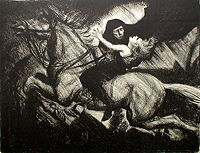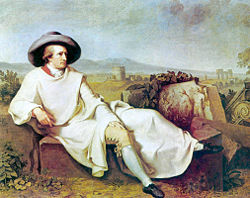Portal:Poetry
2008/9 Schools Wikipedia Selection. Related subjects: Poetry & Opera; Portals
|
Poetry (from the Greek "ποίησις," poiesis, a "making" or "creating") is an art form in which language is used for its aesthetic qualities in addition to, or instead of, notional and semantic content. Poetry has a long history, and early attempts to define poetry, such as Aristotle's Poetics, focused on the various uses of speech in rhetoric, drama, song and comedy. Contemporary poets, such as Dylan Thomas, often identify poetry not as a literary genre within a set of genres, but as a fundamental creative act using language. Poetry often uses condensed forms and conventions to reinforce or expand the meaning of the underlying words or to invoke emotional or sensual experiences in the reader, as well as using devices such as assonance, alliteration and rhythm to achieve musical or incantatory effects.
Der Erlkönig (often called just "Erlkönig") is a poem by Johann Wolfgang von Goethe. It depicts the death of a child assailed by a supernatural being, the "Erlking" (widely translated as "Elf King"). It was originally composed by Goethe as part of a 1782 ballad opera entitled Die Fischerin.
The poem has been used as the text for lieder (art songs for voice and piano) by many classical composers; a list appears here. Of these, the most famous is undoubtedly the one by Franz Schubert, his op. 1 D. 328 (see section below). It was Schubert's most popular song during his lifetime. There have been many other adaptations, notably by Johann Friedrich Reichardt, Carl Friedrich Zelter, Robert Schumann, Hugo Wolf, and Johann Carl Gottfried Löwe; Beethoven attempted to set it to music but abandoned the effort. Goethe in the Roman Campagna (1786) by Johann Heinrich Wilhelm Tischbein. Oil on canvas, 164 x 206 cm. Städelsches Kunstinstitut, Frankfurt.
Image:Hilda Doolittle.jpg Hilda Doolittle ( 10 September 1886, Bethlehem, Pennsylvania, United States – 27 September 1961, Zürich, Switzerland), prominently known only by her initials H.D., was an American poet, novelist and memoirist. She is best known for her association with the key early 20th century avant-garde Imagist group of poets, although her later writing represents a move away from the Imagist model and towards a distinctly feminine version of modernist poetry and prose. Hilda Doolittle was born in Bethlehem, Pennsylvania in Pennsylvania's Lehigh Valley. Her father, Charles Doolittle, was professor of astronomy at Lehigh University and her mother, Helen (Wolle), was a Moravian with a strong interest in music. In 1895, Charles Doolittle was appointed Flower Professor of Astronomy at the University of Pennsylvania, and the family moved to a house in Upper Darby, an affluent Philadelphia suburb.
The pitch accent of Vedic Sanskrit, or Vedic accent for brevity, is traditionally divided by Sanskrit grammarians into three qualities, udātta "raised" ( acute accent), anudātta "not raised" ( grave accent) and svarita "sounded" ( circumflex). In the Rigveda, svarita is marked with a small upright stroke above a syllable and anudātta with a horizontal line below the syllable, while udātta remains unmarked. |
||||||||


